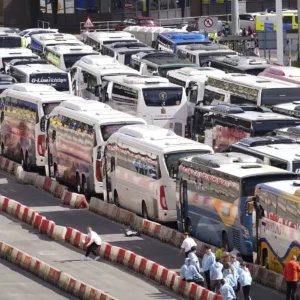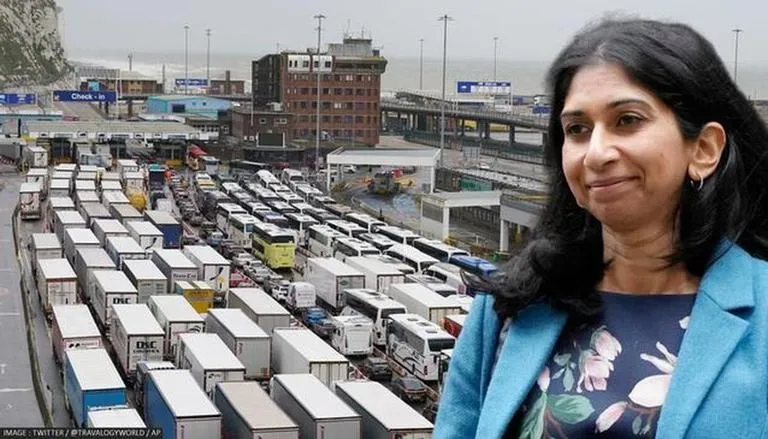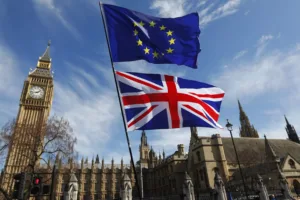
Brexit Denial: Chaos and Anger at Dover as Home Secretary Dismisses Brexit Link to Queue Chaos"

Over the weekend of April 1st, thousands of people faced hours-long queues at Dover Port, as they waited for immigration checks before boarding ferries to France.
This caused significant disruption to travellers, with some school trips being cancelled due to the delays. Despite the frustration and anger of those caught up in the queues, the Home Secretary, Suella Braverman, denied that the post-Brexit checks were to blame for the chaos, instead blaming the bad weather.
Braverman’s comments were met with disbelief and criticism from political opponents, who accused her of being in denial about the impact of Brexit on the border. The Green Party MP, Caroline Lucas, went so far as to say that Braverman was “on another planet as usual.”
Meanwhile, former Conservative cabinet minister David Gauke pointed out that if the UK were still part of the EU, the French would not need to do individual passport checks, which would make the process at Dover quicker. He suggested that the Dover queues were therefore partly caused by Brexit.

The situation at Dover has highlighted some of the challenges that the UK has faced since leaving the European Union. Brexit has resulted in changes to immigration checks, with travellers now required to show their passports and have their details checked by French authorities before they can board a ferry. This has led to longer waiting times at the border, which has caused frustration for travellers and businesses alike.
The chaos at Dover is just one example of the challenges that the UK faces as it adjusts to life outside the EU. However, it is clear that the situation could have been handled better. For example, the government could have provided more resources to deal with additional paperwork checks, as the Shadow Levelling Up Secretary, Lisa Nandy, suggested. There have also been complaints that coach-carrying children were not being adequately prioritized, which is a worrying sign.

It is essential that the UK government works to resolve these issues and provides support to travellers and businesses as they adjust to the new post-Brexit landscape. While there may be short-term disruptions and delays, the government must ensure that it takes steps to mitigate the impact of Brexit and ensure that the border operates as smoothly as possible.
Overall, the chaos at Dover highlights the challenges that the UK faces as it navigates life outside the EU. It is essential that the government listens to the concerns of travellers and businesses and takes steps to address these issues. While there may be teething problems in the short term, it is vital that the UK establishes a smooth and efficient border to enable trade and travel to continue seamlessly between the UK and EU.
The situation at Dover can be solved through a combination of short-term and long-term solutions. In the short term, the UK government can work with ferry companies and the Port of Dover to ensure that resources are in place to deal with additional paperwork checks and to manage the sheer volume of traffic. This may include increasing staffing levels at the border, deploying additional technology to speed up checks, and working with French authorities to streamline the immigration process.
Ferry companies can also take steps to manage the situation, such as increasing the number of sailings, providing regular updates to customers, and prioritizing coaches carrying children and other vulnerable groups. They can also work with the Port of Dover to ensure that there is adequate food, water, and sanitation available for those stuck in queues.

In the long term, the UK government can work to address the root causes of the problem. This includes addressing any inefficiencies in the border process, investing in infrastructure and technology to speed up checks, and negotiating agreements with other countries to streamline the immigration process.
The government can also work to mitigate the impact of Brexit on the border by negotiating new agreements with the EU and other countries. This could include agreements on mutual recognition of standards, which would reduce the need for additional checks and paperwork.
Ultimately, the situation at Dover highlights the need for a comprehensive and coordinated approach to managing the border. This requires close collaboration between the government, ferry companies, and other stakeholders, as well as a long-term commitment to investing in the infrastructure and technology needed to streamline the immigration process. By taking these steps, the UK can ensure that the Dover queues do not become a permanent feature of post-Brexit travel.







